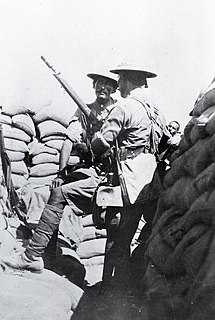 W
WThe Chindits, known officially as the Long Range Penetration Groups, were special-operations units of the British and Indian armies which saw action in 1943–1944 during the Burma Campaign of World War II.
 W
WThe 4th Indian Infantry Division, also known as the Red Eagle Division, is the infantry division name the Indian Army retained after the present India adopted its entire rank and structure from its parent Army, the British Army.
 W
WThe 5th Indian Infantry Division was an infantry division of the Indian Army during World War II that fought in several theatres of war and was nicknamed the "Ball of Fire". It was one of the few Allied divisions to fight against three different armies - the Italian, German and Japanese armies.
 W
WThe 7th Infantry Division is a war-formed infantry division, part of the Indian Army that saw service in the Burma Campaign.
 W
WThe 7th (Meerut) Division was an infantry division of the British Indian Army that saw active service during World War I.
 W
WThe 8th Mountain Division was raised as the 8th Indian Infantry division of the British Indian Army. It is now part of the Indian Army and specialises in mountain warfare.
 W
WThe 9th Indian Infantry Division was an infantry division of the Indian Army during World War II. The division formed part of Indian III Corps in the Malaya Command during the Battle of Malaya. It was commanded by Major-General Arthur Edward Barstow.
 W
WThe 10th Indian Infantry Division was a war formed infantry division of the Indian Army during World War II. In four years, the division travelled over 4,000 miles (6,400 km) from Tehran to Trieste, fought three small wars, and fought two great campaigns: the Anglo-Iraqi War, the Invasion of Syria-Lebanon, the Anglo-Soviet invasion of Iran, the North African Campaign, and the Italian Campaign.
 W
WThe 14th Indian Infantry Division was an infantry division of the Indian Army during World War II. It fought in the Arakan Campaign 1942–43, and was subsequently converted into a Training Division, providing drafts of replacements for units of the Fourteenth Army during the Burma Campaign.
 W
WThe 17th Infantry Division is a formation of the Indian Army. During World War II, it had the distinction of being continually in combat during the three-year-long Burma Campaign.
 W
WThe 19th Indian Infantry Division was an infantry division of the Indian Army during World War II, and played a prominent part in the final part of the Burma Campaign.
 W
WThe 20th Indian Infantry Division was an infantry division of the Indian Army in the Second World War, formed in India, and took part in the Burma Campaign during the Second World War. After the war, the bulk of the division was deployed to French Indochina to oversee the handover from Japanese to French rule. For nearly all is operational life the division was commanded by Major-General Douglas Gracey. The division's history is subject of open source and historical records research, including the Order of Battle, on an open access, WW2 history website and subject of updates in August 2021
 W
WThe 23rd Indian Infantry Division was an infantry division of the Indian Army during World War II. It fought in the Burma Campaign. It was then reformed as a division of the independent Indian Army in 1959.
 W
WThe 25th Indian Infantry Division was an infantry division of the Indian Army during World War II which fought in the Burma Campaign. It was re-raised within the post-independence Indian Army in 1948.
 W
WThe 26th Indian Infantry Division, was an infantry division of the Indian Army during World War II. It fought in the Burma Campaign.
 W
WThe 31st Indian Armoured Division was an armoured division of the Indian Army during World War II, formed in 1940, originally as the 1st Indian Armoured Division; it consisted of units of the British Army and the British Indian Army. When it was raised, it consisted of two Armoured Brigades and one Motor Brigade.
 W
WThe 36th Indian Infantry Division was an infantry division of the Indian Army during World War II. The division was subsequently redesignated as a British Army formation, the 36th Infantry Division in September 1944. It served in India and during the Burma Campaign. After the end of the war it was disbanded and its remaining British units were transferred to the British 2nd Infantry Division.
 W
WThe 44th Indian Airborne Division was an airborne forces division of the Indian Army during World War II, created in 1944. It provided a parachute battalion for one minor airborne operation, but the war ended before the complete formation could take part..